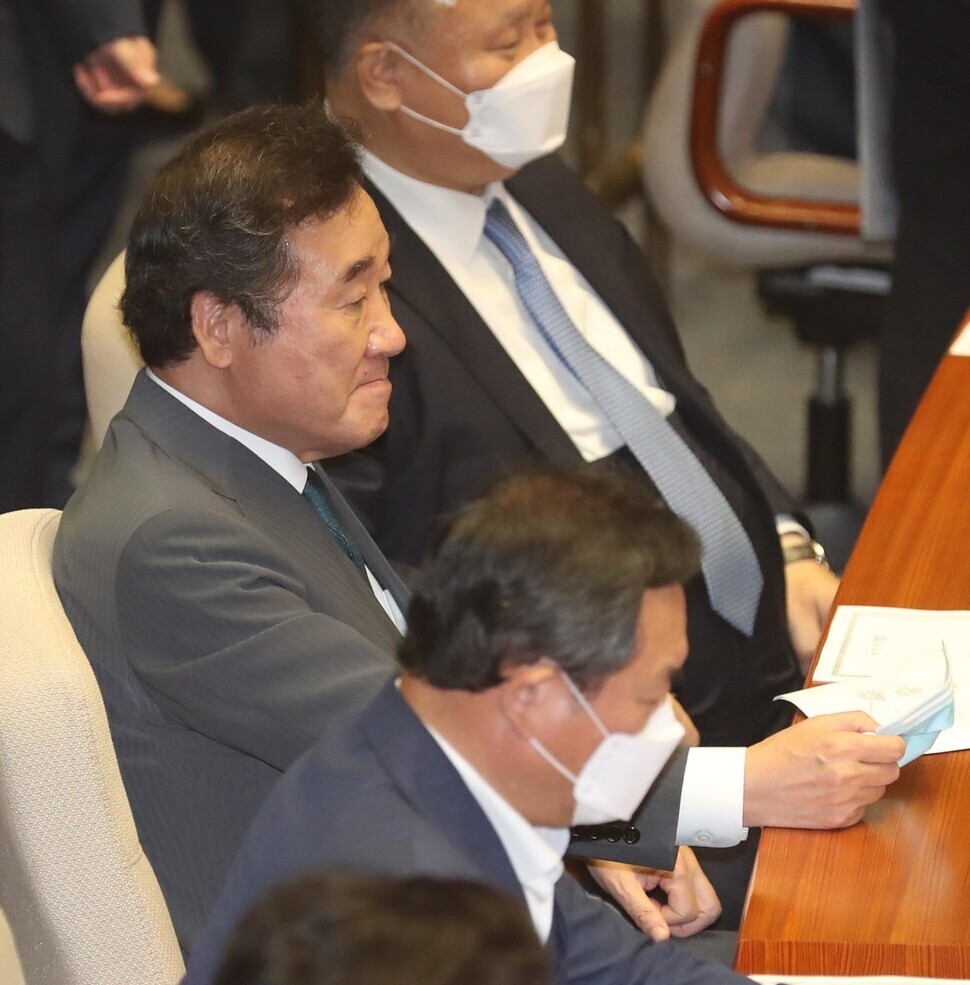hankyoreh
Links to other country sites 다른 나라 사이트 링크
Support for Lee Nak-yeon as presidential candidate slides from 40% to 25.6% in 3 months

After reaching 40% in a survey three months ago on preferred candidates for the next South Korean presidential election, Democratic Party lawmaker Lee Nak-yeon’s support ratings have been sliding sharply. Lee is still seen as a likely contender to become party leader at the convention on Aug. 29, but some observers in and around his camp are concerned that the tumbling support ratings could lead to him going no farther.
On Aug. 4, the public opinion polling institution Real Meter released findings from a survey on preferred candidates for the next presidential election. The results showed Lee Nak-yeon supported by 25.6% of respondents and Gyeonggi Gov. Lee Jae-myung by 19.6%. Commissioned by OhmyNews, the survey was administered between July 27 and 31 to 2,560 adult respondents, with a margin of error of ±1.9 percentage points and a 95% confidence level. The same preference polls showed Lee Nak-yeon pulling 40.2% in April, but slipping to 34.3% in May and to 30.8% in June. Meanwhile, Lee Jae-myung has been quickly narrowing the gap, moving up from the 14-15% range in April and May to 15.6% as of June.
Members of Lee Nak-yeon’s camp attributed the change to Lee being directly impacted by the inadequate response to various problems emerging for the party due to the “symbolism” of his having been the Moon Jae-in administration’s first prime minister. The argument is that Lee misstepped by failing to live up to his reputation for “sternness” and speak out on ongoing controversies involving the sexual harassment allegations surrounding late former Seoul Mayor Park Won-soon and sharp rises in housing prices.
“Rep. Lee Nak-yeon definitely has not met expectations, so it’s not at all surprising that [his support ratings] have been falling,” a camp staffer said.
“But there’s also been an element of [Lee’s] stature to date being somewhat vague. It looks as though the public’s assessment of him has dropped because he hasn’t been in a position to respond [with an official position],” the official added. Camp members predicted his support ratings would start rising again once he is cemented as party leader.
The same “vague position” mentioned by Lee’s camp was also pointed to by experts as Lee’s “dilemma.” Political commentator Yu Chang-seon said, “There had been a lot of hopes that Lee would be a balanced politician, but he’s given the impression of being a wealthy person looking out for his own interests.”
“There are concerns that if he focuses on taking his cues from the party’s mainstream, he’s going to end up as a politician without a position of his own, whereas if he speaks for himself his support ratings could reverse at any moment due to his lack of a party base,” Yu explained. The argument is that while Lee enjoys the advantage of support from the pro-Moon contingent due to his history as the prime minister, that same framework also restricts him from speaking independently. Lee is also in a position where he has to worry about potentially decisive pro-Moon camp votes ahead of the party leadership election.
“If anything, that preference rate of 40% was unusually high,” argued Park Seong-min, CEO of the political consulting group Min.
“At the time, there wasn’t any clear presidential contender on the opposition side. Now there’s not only Prosecutor-General Yoon Suk-yeol but also a rise in preference ratings for Gyeonggi Gov. Lee Jae-myung since his Supreme Court ruling, so there’s been some shifting of support,” Park explained.
By Seo Young-ji, staff reporter
Please direct comments or questions to [english@hani.co.kr]

Editorial・opinion
![[Editorial] Does Yoon think the Korean public is wrong? [Editorial] Does Yoon think the Korean public is wrong?](https://flexible.img.hani.co.kr/flexible/normal/500/300/imgdb/original/2024/0417/8517133419684774.jpg) [Editorial] Does Yoon think the Korean public is wrong?
[Editorial] Does Yoon think the Korean public is wrong?![[Editorial] As it bolsters its alliance with US, Japan must be accountable for past [Editorial] As it bolsters its alliance with US, Japan must be accountable for past](https://flexible.img.hani.co.kr/flexible/normal/500/300/imgdb/original/2024/0417/6817133413968321.jpg) [Editorial] As it bolsters its alliance with US, Japan must be accountable for past
[Editorial] As it bolsters its alliance with US, Japan must be accountable for past- [Guest essay] Amending the Constitution is Yoon’s key to leaving office in public’s good graces
- [Editorial] 10 years on, lessons of Sewol tragedy must never be forgotten
- [Column] A death blow to Korea’s prosecutor politics
- [Correspondent’s column] The US and the end of Japanese pacifism
- [Guest essay] How Korea turned its trainee doctors into monsters
- [Guest essay] As someone who helped forge Seoul-Moscow ties, their status today troubles me
- [Editorial] Koreans sent a loud and clear message to Yoon
- [Column] In Korea’s midterm elections, it’s time for accountability
Most viewed articles
- 1[Column] The clock is ticking for Korea’s first lady
- 2Samsung barricades office as unionized workers strike for better conditions
- 3[Editorial] When the choice is kids or career, Korea will never overcome birth rate woes
- 4[News analysis] After elections, prosecutorial reform will likely make legislative agenda
- 5S. Korea, Japan reaffirm commitment to strengthening trilateral ties with US
- 6Why Israel isn’t hitting Iran with immediate retaliation
- 7[Guest essay] How Korea turned its trainee doctors into monsters
- 8Japan officially says compensation of Korean forced laborers isn’t its responsibility
- 9[Editorial] Does Yoon think the Korean public is wrong?
- 10[Editorial] 10 years on, lessons of Sewol tragedy must never be forgotten